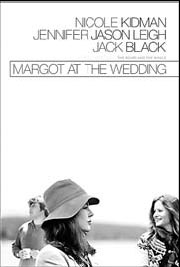Reviews
Film
Margot at the Wedding

Directed by Noah Baumbach, starring Nicole Kidman, Jennifer Jason Leigh, Jack Black, Zane Pais, Ciaran Hinds, Flora Cross
Margot at the Wedding is one of those movies defined in its locale and time scale by an occasion in which families, together with the odd interloper, gather for celebration and bloodletting at Christmas, Thanksgiving, an anniversary, a funeral or, as here, a wedding. The place is an idyllic old house on the New England coast, which Pauline Zeller (Jennifer Jason Leigh), a divorcee in her late thirties, has inherited from her mother and where she's about to marry Malcolm (Jack Black), an unemployed painter and musician. Her sister, Margot (Nicole Kidman), a respected short-story writer, published, like the mother in The Squid, in the New Yorker, comes to the wedding with her pubescent son Claude (Zane Pais), traveling from Manhattan by train, ferry and finally picked up by Malcolm in a rundown Volvo estate.
From the beginning, there is a war of attrition between Margot and Pauline, with occasional truces to remember happy moments of shared experience and to offer barbed compliments. Pauline resents Margot's success and the way she has exploited her and the family in her work.
Margot is using the wedding as an excuse to visit her secret lover, a smug popular novelist Dick (Ciaran Hinds), whose summer home is nearby. Pauline is open, vulnerable, warmly disposed to her young daughter and secretly pregnant. Margot (does the name come unconsciously from Bette Davis's Margo Channing in All About Eve?) is a destructive force, undermining everyone around her.
She's on the point of leaving her writer husband, but withholds this from her son, whose confidence she constantly builds up and brings down. The habitual decency of her husband (John Turturro) elicits from her a bitter: "Sometimes I think you're so despicable."
From their first meeting, Margot thinks the heavy-smoking, overweight Malcolm a born loser, unworthy of her sister's hand or entry into the family. There's an echo here of A Streetcar Named Desire. Malcolm is indeed a sorry case who devotes most of his intellectual energy to writing angry letters to newspapers about the state of the culture. His bitter, self-deprecating wit is a defense against examining his life; he attempts to avoid confronting any problem by saying: "Let's fuck" (to which Pauline inevitably responds) and he takes grievous advantage of a nubile babysitter. But he's in a critical state, as is everyone else, including the neurotic Margot who in a public interview at a local library is brought close to a nervous breakdown by her lover.
Baumbach's dialogue always rings true and he's very good at involving the audience in embarrassing situations in which we share the mocker's schadenfreude while sympathizing with the victims. There's a scene, for instance, where Margot is egged on to climb a tree that she always scampered up as a teenager. This time she gets to the top, but becomes paralyzed and the fire brigade comes as if she were a stranded family pet. An old, much-loved oak tree also figures in a symbolic fashion: the imminent wedding ceremony will take place beneath it, but the threatening, anti-genteel new neighbors are demanding that it be cut down as a danger to their property.
The Guardian
Book
Old Beijing
While Peking Opera does not attract a large young audience, old Beijing's clay figurines, snacks and riddles are also fading away from people's daily life. Still, old Beijing dialect and hucksters' cries can still be heard in hutong alleys.
Old Beijing, a breezy book with fabulous pictures, might help bring back memories of the past. Yang Cheng narrates nine scenes from everyday life in the first person, like streets, hutong, old brands and occupation. His partner Sheng Xishan, a member of China's Artists' Association, illustrates Yang's narration, creating a full-bodied work looking back at the old Beijing.
The book will be translated to English, French and German soon. Cheng Anqi
(China Daily 03/05/2008 page20)














